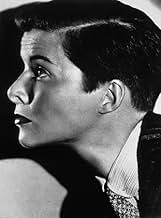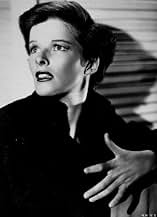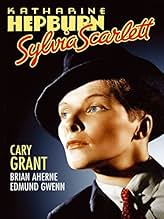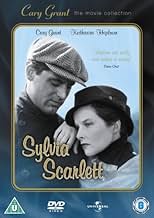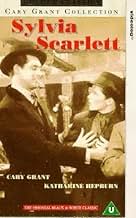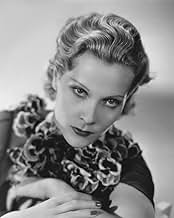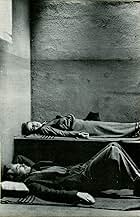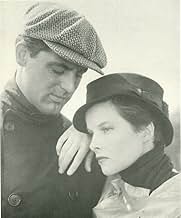IMDb-BEWERTUNG
6,2/10
4782
IHRE BEWERTUNG
Füge eine Handlung in deiner Sprache hinzuWhen her father decides to flee to England, young Sylvia Scarlett must become Sylvester Scarlett and protect her father every step of the way, with the questionable help of plenty others.When her father decides to flee to England, young Sylvia Scarlett must become Sylvester Scarlett and protect her father every step of the way, with the questionable help of plenty others.When her father decides to flee to England, young Sylvia Scarlett must become Sylvester Scarlett and protect her father every step of the way, with the questionable help of plenty others.
- Auszeichnungen
- 1 wins total
Robert Adair
- Turnkey
- (Nicht genannt)
Bunny Beatty
- Maid
- (Nicht genannt)
May Beatty
- Older Woman on Ship
- (Nicht genannt)
Daisy Belmore
- Fat Woman on Beach
- (Nicht genannt)
Carmen Beretta
- Woman
- (Nicht genannt)
Nina Borget
- Minor Role
- (Nicht genannt)
Thomas Braidon
- Minor Role
- (Nicht genannt)
Elsa Buchanan
- Minor Role
- (Nicht genannt)
Colin Campbell
- Minor Role
- (Nicht genannt)
James Carlisle
- Park Scam Onlooker
- (Nicht genannt)
Patricia Caron
- Minor Role
- (Nicht genannt)
Harold Cheevers
- Bobby
- (Nicht genannt)
E.E. Clive
- Customs Inspector
- (Nicht genannt)
Edward Cooper
- Customs Inspector
- (Nicht genannt)
Empfohlene Bewertungen
An extremely unusual little film from director George Cukor makes the odd transition from caper comedy to coming of age romance - and occasionally teeters back and forth between the two. The film was a massive flop at the box office (in order to make amends for the film's failure, Cukor and star Katharine Hepburn reportedly offered to make their next film for free), and the audiences of thirties just didn't seem to understand film's bizarre juxtaposition between gritty depression-era realism and dreamy Hollywood surrealism. In all truth, however, the film is enormously entertaining when viewed today, and its unusual tone will be better appreciated by modern audiences.
Although this is the performance that led her to be labeled by critics and theater owners as "box office poison," Hepburn is delightful in role that was quite offbeat for the time (this was 48 years before Barbra Streisand donned male drag in YENTL). Brian Aherne also delivers an endearingly off-kilter performance as Sylvia's love interest, and Edmund Gwenn is terrific in the difficult role of Sylvia's father, who must balance humor and pathos at regular intervals. Best of all is Cary Grant who flat-out nails his role as a cockney con man, and simply radiates with wit, sex appeal, and macho charisma. He alone would make the film worth watching, but, on the whole, SYLVIA SCARLETT remains a lost gem that was very much ahead of its time.
Although this is the performance that led her to be labeled by critics and theater owners as "box office poison," Hepburn is delightful in role that was quite offbeat for the time (this was 48 years before Barbra Streisand donned male drag in YENTL). Brian Aherne also delivers an endearingly off-kilter performance as Sylvia's love interest, and Edmund Gwenn is terrific in the difficult role of Sylvia's father, who must balance humor and pathos at regular intervals. Best of all is Cary Grant who flat-out nails his role as a cockney con man, and simply radiates with wit, sex appeal, and macho charisma. He alone would make the film worth watching, but, on the whole, SYLVIA SCARLETT remains a lost gem that was very much ahead of its time.
This is an odd film - definitely an odd one. Even in a period when the Hayes Office, the Breen Office, the movie code, and the Catholic Legion of Decency were still finding their feet, this film just stretched gender roles as far as possible. And the audiences of 1935, who tolerated MUTINY ON THE BOUNTY, THE INFORMER, and many other films, would not tolerate this one.
The issue is whether or not the audiences of 2006 would tolerate it. I gather that we are better used to bi-sexual, homosexual, or transsexual genres in movies in the last half century, but having said that I keep realizing that many people aren't. I also note that of the four Grant - Hepburn films this one is the least revived (which is odd, because it was the first one made). I have a feeling that the fans of this film fall into three categories: those who enjoy the sexual suggestiveness of it's storyline, those who enjoy the two stars and their acting abilities, and those who like the director, George Cukor. Outside those three groups, there are many people who are probably (at best) indifferent to this movie, and (at worst) positively hostile to it.
I could understand part of the hostility. It is the crazy screenplay in the film. This movie never comes to grips with exactly what it wants to do. It starts off with a kind of "Dr. Crippen" situation (though actually not as serious), wherein Edmund Gwenn has committed embezzlement and must flee France with his daughter Hepburn - whom he disguises as a son to help his own escape disguise (this resembles Crippen's disguising his girlfriend Ethel Le Neve as a son when fleeing to Canada on the "Montrose"). Hepburn just barely passes as a boy (her bony face just makes it). Then they meet grifter Cary Grant, and join him in a series of con games.
First problem in script here - if Gwenn and Hepburn are fleeing the French authorities to get to England, doesn't it undercut their efforts to continue a criminal path with Grant? If they are caught (as they nearly are) the British police will return Gwenn to France, rather than probably ignore him if he just behaves himself in England. Of course, for them to get into a story involving Grant the script requires them to behave in line with him.
This was the first film that Katherine Hepburn and Cary Grant appeared in together, and in the wake of the later Tracy series it has somehow gotten pushed slightly (not totally) into the shadows. It is similar to the series of musicals by Jeanette MacDonald and Maurice Chevalier for Paramount in the early 1930s, that are slightly (not quite totally) in the shadows of the later musical series with Nelson Eddy. The later films (particularly BRINGING UP BABY and THE PHILADELPHIA STORY) are far more popular - despite the screwiness of the former those films (and HOLIDAY) have coherent plots. We aren't trying to figure out if the film is funny or sad, or if it's about con artists or small time performers. We don't have to worry in the later three films about allegory (the scene in SCARLET when they are performing in Comedia del Arte costumes, with Gwenn - growing jealous about his girlfriend's activities - dressed as "Pierrot" is definitely allegorical). One can say SYLVIA SCARLET is a film with something for everyone - question is does that make it a good film?
Because I like George Cukor (who later would work with both Grant and Hepburn to better effect), and see that Hepburn and Grant and Brian Ahearn and Gwenn are giving their all to their parts, I am willing to say I'm favorably impressed enough to give this an "8" out of "10". But I will maintain that this odd little movie is not one meant for large audiences or for huge popular approval.
The issue is whether or not the audiences of 2006 would tolerate it. I gather that we are better used to bi-sexual, homosexual, or transsexual genres in movies in the last half century, but having said that I keep realizing that many people aren't. I also note that of the four Grant - Hepburn films this one is the least revived (which is odd, because it was the first one made). I have a feeling that the fans of this film fall into three categories: those who enjoy the sexual suggestiveness of it's storyline, those who enjoy the two stars and their acting abilities, and those who like the director, George Cukor. Outside those three groups, there are many people who are probably (at best) indifferent to this movie, and (at worst) positively hostile to it.
I could understand part of the hostility. It is the crazy screenplay in the film. This movie never comes to grips with exactly what it wants to do. It starts off with a kind of "Dr. Crippen" situation (though actually not as serious), wherein Edmund Gwenn has committed embezzlement and must flee France with his daughter Hepburn - whom he disguises as a son to help his own escape disguise (this resembles Crippen's disguising his girlfriend Ethel Le Neve as a son when fleeing to Canada on the "Montrose"). Hepburn just barely passes as a boy (her bony face just makes it). Then they meet grifter Cary Grant, and join him in a series of con games.
First problem in script here - if Gwenn and Hepburn are fleeing the French authorities to get to England, doesn't it undercut their efforts to continue a criminal path with Grant? If they are caught (as they nearly are) the British police will return Gwenn to France, rather than probably ignore him if he just behaves himself in England. Of course, for them to get into a story involving Grant the script requires them to behave in line with him.
This was the first film that Katherine Hepburn and Cary Grant appeared in together, and in the wake of the later Tracy series it has somehow gotten pushed slightly (not totally) into the shadows. It is similar to the series of musicals by Jeanette MacDonald and Maurice Chevalier for Paramount in the early 1930s, that are slightly (not quite totally) in the shadows of the later musical series with Nelson Eddy. The later films (particularly BRINGING UP BABY and THE PHILADELPHIA STORY) are far more popular - despite the screwiness of the former those films (and HOLIDAY) have coherent plots. We aren't trying to figure out if the film is funny or sad, or if it's about con artists or small time performers. We don't have to worry in the later three films about allegory (the scene in SCARLET when they are performing in Comedia del Arte costumes, with Gwenn - growing jealous about his girlfriend's activities - dressed as "Pierrot" is definitely allegorical). One can say SYLVIA SCARLET is a film with something for everyone - question is does that make it a good film?
Because I like George Cukor (who later would work with both Grant and Hepburn to better effect), and see that Hepburn and Grant and Brian Ahearn and Gwenn are giving their all to their parts, I am willing to say I'm favorably impressed enough to give this an "8" out of "10". But I will maintain that this odd little movie is not one meant for large audiences or for huge popular approval.
Not a great movie, or even a very successful one in conventional terms, but quite fascinating to watch. A lot of people are put off by the semi-deliberate artificiality of the acting and the fanciful nature of the story, at least up to the moment where Hepburn reveals herself as a woman to Aherne.
But I think this is the point. Cukor (and Hepburn) were striving for something a bit like A Midsummer Night's Dream (which Hollywood was filming around the same time). A bunch of con-artist misfits meet up and then find a spot for themselves as a sort of traveling commedia dell-arte stage act. They fetch up in an artists' colony in Cornwall, where they are presumably more accepted than elsewhere. A kind of 1930s Forest of Arden.
There, Sylvia's masquerade is not scandalous but amusing. And just as there's actual enchantment in Shakespeare's play, the manner in which Hepburn is revealed as a woman to Aherne (an artist, of course) suggests that on some level she wasn't just masquerading. She literally is transformed back from a boy to a girl, who has to be taught once again what a girl (they never say woman in the movie) behaves like. Instead of appearing threatening to conventional notions of gender, the film underlines Sylvia/Sylvester's vulnerability and innocence.
The gay angle is clear: The theater, and the world of artists, is where Hepburn and her companions (impecunious, emotionally unstable father; odd, flighty servant girl; amoral con artist) are accepted and not judged, where her masquerade isn't a crime but an artistic achievement. Sylvia Scarlett is an effort to make American audiences embrace and find the charm in ways of life it officially rejected.
The whole concept is pretty stagy, but of course Cukor and Hepburn both came from the theater.
But while it all must have looked doable good on paper, it doesn't really work on screen. The script undermines it, for one thing: the plot is full of holes and soon after the big scene with Aherne, the enchantment and strangeness start to drain out of the story, which turns into conventional girl-meets-boy. The only remaining question is whether Kate will find up with Cary or Brian, and that just doesn't hold much interest.
One reason for this is Cukor. He was a fine director of actors, and with a good script he could make a marvelous picture. But he wasn't a great visual artist, like Ford or Welles or Hawks, who could often take mediocre writing and make it sing on screen. This is the highest-concept film he ever made, except possibly Justine late in his career, and he doesn't really have the knack for it. The broad playing and semi-Shakespearean humor never really work the way they should, and Cukor can't seem to make Sylvia's father, the darker character in the whole thing, mesh with the rest.
I wonder if the story wouldn't have been more at home in the silent cinema, where there was more latitude for enchantment and masquerade and make-believe? How would FW Murnau (Sunrise) have handled this material, for example? Hepburn herself is at her best and most entertaining in her scenes as Sylvester. She's acrobatic and rambunctious and fun to watch. The other characters treat her as a sort of adorable boy, kind of like Cherubino in The Marriage of Figaro. Very much in keeping with the deliberately theatrical atmosphere the movie tries for. Once Hepburn puts on a dress again, however, she tends to subside into that familiar Hepburn wonderfulness that can be annoying in some of her other films. The rest of the cast is just fine.
Could this have been a better movie? David Thomson suggests that another director and star (Hawks and Stanwyck, perhaps) could have made it work. Perhaps - but it would have been more conventional. I doubt that anyone else would have opted for the enchanted-forest, Midsummer Night's Dream approach that makes it so interesting. Again, I think it would have had a better chance in the silent era.
Too bad, however, that someone didn't try again!
But I think this is the point. Cukor (and Hepburn) were striving for something a bit like A Midsummer Night's Dream (which Hollywood was filming around the same time). A bunch of con-artist misfits meet up and then find a spot for themselves as a sort of traveling commedia dell-arte stage act. They fetch up in an artists' colony in Cornwall, where they are presumably more accepted than elsewhere. A kind of 1930s Forest of Arden.
There, Sylvia's masquerade is not scandalous but amusing. And just as there's actual enchantment in Shakespeare's play, the manner in which Hepburn is revealed as a woman to Aherne (an artist, of course) suggests that on some level she wasn't just masquerading. She literally is transformed back from a boy to a girl, who has to be taught once again what a girl (they never say woman in the movie) behaves like. Instead of appearing threatening to conventional notions of gender, the film underlines Sylvia/Sylvester's vulnerability and innocence.
The gay angle is clear: The theater, and the world of artists, is where Hepburn and her companions (impecunious, emotionally unstable father; odd, flighty servant girl; amoral con artist) are accepted and not judged, where her masquerade isn't a crime but an artistic achievement. Sylvia Scarlett is an effort to make American audiences embrace and find the charm in ways of life it officially rejected.
The whole concept is pretty stagy, but of course Cukor and Hepburn both came from the theater.
But while it all must have looked doable good on paper, it doesn't really work on screen. The script undermines it, for one thing: the plot is full of holes and soon after the big scene with Aherne, the enchantment and strangeness start to drain out of the story, which turns into conventional girl-meets-boy. The only remaining question is whether Kate will find up with Cary or Brian, and that just doesn't hold much interest.
One reason for this is Cukor. He was a fine director of actors, and with a good script he could make a marvelous picture. But he wasn't a great visual artist, like Ford or Welles or Hawks, who could often take mediocre writing and make it sing on screen. This is the highest-concept film he ever made, except possibly Justine late in his career, and he doesn't really have the knack for it. The broad playing and semi-Shakespearean humor never really work the way they should, and Cukor can't seem to make Sylvia's father, the darker character in the whole thing, mesh with the rest.
I wonder if the story wouldn't have been more at home in the silent cinema, where there was more latitude for enchantment and masquerade and make-believe? How would FW Murnau (Sunrise) have handled this material, for example? Hepburn herself is at her best and most entertaining in her scenes as Sylvester. She's acrobatic and rambunctious and fun to watch. The other characters treat her as a sort of adorable boy, kind of like Cherubino in The Marriage of Figaro. Very much in keeping with the deliberately theatrical atmosphere the movie tries for. Once Hepburn puts on a dress again, however, she tends to subside into that familiar Hepburn wonderfulness that can be annoying in some of her other films. The rest of the cast is just fine.
Could this have been a better movie? David Thomson suggests that another director and star (Hawks and Stanwyck, perhaps) could have made it work. Perhaps - but it would have been more conventional. I doubt that anyone else would have opted for the enchanted-forest, Midsummer Night's Dream approach that makes it so interesting. Again, I think it would have had a better chance in the silent era.
Too bad, however, that someone didn't try again!
There seem to be some very common unfortunate negative feelings about this film ("SS"), which I think are mostly a clash of expectations with execution. The film presents two great stars in unexpected roles with unexpectedly complicated characters and quirky humor.
This is an interesting platform for Hepburn's developing style, moving her from relatively straightforward "strong female" roles (Christopher Strong, The Little Minister 1932-1934) to more multifaceted personas where Hepburn has to interact more with her femininity (Alice Adams, Quality Street 1935-1937). Sylvia's concern with her sexuality is very disconcertingly captured by the alternatingly coquettish and belligerent Hepburn.
Cary Grant's role in SS is a dark type he didn't get to do often enough, but excelled at. Grant has in this movie a truly unredeemable side that can't be whitewashed by just putting on nice clothes or changing his accent--a side he perfected in None But The Lonely Heart.
The movie also has great virtue as a cultural island in rather intolerant times. The faint undertones of male (Sylvester and Michael Fane) and female (Sylvia and Maudie and Lily) homosexuality are subtle and effectively done, and of course the transvestitism is diverting: the scene where Hepburn meets the owner of her dress is a classic.
Overall, the humor and characterizations in SS are pointed in so many directions that it's hard to figure out whether the movie is deep or ditzy. I have my doubts--the change from con-men to vaudevillians would be hilarious if it weren't so bizarre--but I vote for the former. This movie deserves its place beside Bringing Up Baby, Holiday and The Philadelphia Story as an enduring work of the Hepburn/Grant collaboration.
This is an interesting platform for Hepburn's developing style, moving her from relatively straightforward "strong female" roles (Christopher Strong, The Little Minister 1932-1934) to more multifaceted personas where Hepburn has to interact more with her femininity (Alice Adams, Quality Street 1935-1937). Sylvia's concern with her sexuality is very disconcertingly captured by the alternatingly coquettish and belligerent Hepburn.
Cary Grant's role in SS is a dark type he didn't get to do often enough, but excelled at. Grant has in this movie a truly unredeemable side that can't be whitewashed by just putting on nice clothes or changing his accent--a side he perfected in None But The Lonely Heart.
The movie also has great virtue as a cultural island in rather intolerant times. The faint undertones of male (Sylvester and Michael Fane) and female (Sylvia and Maudie and Lily) homosexuality are subtle and effectively done, and of course the transvestitism is diverting: the scene where Hepburn meets the owner of her dress is a classic.
Overall, the humor and characterizations in SS are pointed in so many directions that it's hard to figure out whether the movie is deep or ditzy. I have my doubts--the change from con-men to vaudevillians would be hilarious if it weren't so bizarre--but I vote for the former. This movie deserves its place beside Bringing Up Baby, Holiday and The Philadelphia Story as an enduring work of the Hepburn/Grant collaboration.
"Odd" doesn't begin to describe what transpires in this movie. It's all like someone's dream, with unconnected events moving in and out of each other - tied together with the loosest of threads - with no real meaning. The only real reason to watch this movie is to see Hepburn and Grant before they were really big.
Unfortunately, there is absolutely no chemistry at all between any of the characters. Grant is handed a terribly drawn character and gets no real room to develop a relationship with the audience - or anyone else. Hepburn is just screechingly annoying. The rest of the cast isn't too much better, but I don't blame them. It's a terrible, terrible screenplay and is not an enjoyable time to sit through.
That's another thing. I wouldn't really have minded all the bad elements of the movie if I had a good time watching it. If not a few good laughs, at least Grant/Hepburn is usually worth some interest because of their ability to bring out the best in each other. No such luck here.
Unfortunately, there is absolutely no chemistry at all between any of the characters. Grant is handed a terribly drawn character and gets no real room to develop a relationship with the audience - or anyone else. Hepburn is just screechingly annoying. The rest of the cast isn't too much better, but I don't blame them. It's a terrible, terrible screenplay and is not an enjoyable time to sit through.
That's another thing. I wouldn't really have minded all the bad elements of the movie if I had a good time watching it. If not a few good laughs, at least Grant/Hepburn is usually worth some interest because of their ability to bring out the best in each other. No such luck here.
Wusstest du schon
- WissenswertesAfter a disastrous preview, director George Cukor and Katharine Hepburn went to RKO producer Pandro S. Berman's home and offered their services for free for another film. Berman, who was furious at the quality of the movie, replied tersely, "Don't bother, please."
- PatzerWhen Sylvester yells for a cop outside the mansion, Henry gets left outside. Jimmy opens the door and pulls Henry in roughly. In doing so, Henry loses a shoe. Inside the mansion, Henry has both shoes, never having retrieved his shoe from outside.
- Zitate
Sylvia Scarlett: Well, we're all fools sometimes. Only you choose such awkward times.
- VerbindungenFeatured in The Men Who Made the Movies: George Cukor (1973)
- SoundtracksHello ! Hello ! Who's your Lady Friend ?
(uncredited)
Music by Harry Fragson
Lyrics by Worton David and Bert Lee (1914)
Sung by Cary Grant and Edmund Gwenn
Top-Auswahl
Melde dich zum Bewerten an und greife auf die Watchlist für personalisierte Empfehlungen zu.
- How long is Sylvia Scarlett?Powered by Alexa
Details
- Erscheinungsdatum
- Herkunftsland
- Sprachen
- Auch bekannt als
- En förtjusande pojke
- Drehorte
- Produktionsfirma
- Weitere beteiligte Unternehmen bei IMDbPro anzeigen
Box Office
- Budget
- 641.000 $ (geschätzt)
- Laufzeit1 Stunde 35 Minuten
- Farbe
- Seitenverhältnis
- 1.37 : 1
Zu dieser Seite beitragen
Bearbeitung vorschlagen oder fehlenden Inhalt hinzufügen

Oberste Lücke
By what name was Sylvia Scarlett (1935) officially released in India in English?
Antwort
